ETL testing automation ensures data accuracy and reliability by automating validation during the extract, transform, and load process. This is crucial for organizations handling large datasets and complex workflows. Manual testing often leads to errors, delays, and scalability issues, making automation a necessity in today’s fast-paced data environments.
Here’s a quick summary of the top ETL testing tools and what they offer:
- QuerySurge: AI-powered validation, integrates with BI tools, and reduces manual testing time by up to 80%.
- Informatica Data Validation: Ideal for large enterprises, tightly integrates with Informatica products.
- Datagaps ETL Validator: User-friendly with drag-and-drop features, supports detailed reporting.
- Talend Open Studio: Open-source, free, and highly customizable for technical teams.
- iCEDQ: Strong compliance features, over 50 connectors, and CI/CD pipeline integration.
- RightData: Self-service design for non-technical users, efficient for large datasets.
- BiG EVAL: Simplifies validation with a focus on U.S.-specific needs.
Quick Comparison
| Tool | Best For | Key Features | Cost |
|---|---|---|---|
| QuerySurge | Enterprise-scale testing | AI validation, BI integration | Premium |
| Informatica | Large enterprises | Rule-based automation, PowerCenter | Premium |
| Datagaps | Small to mid-sized businesses | Drag-and-drop, detailed reporting | Medium |
| Talend | Small teams, startups | Free, open-source, customizable | Free |
| iCEDQ | Compliance-heavy industries | Rules-based, strong audit trails | Premium |
| RightData | Non-technical users | Bulk validation, easy deployment | Medium |
| BiG EVAL | U.S.-focused organizations | Cost-effective, user-friendly | Medium |
Key Takeaway
The right ETL testing tool depends on your needs - enterprise-grade features for large operations, cost-effective open-source options for smaller teams, or compliance-focused tools for regulated industries. Start small with a trial or pilot project to find the best fit for your workflows.
Automate Your ETL Testing: Boost Data Quality & Efficiency (Live Demo)
What to Look for in ETL Testing Tools
When manual ETL testing becomes a bottleneck, the right tool can dramatically improve your data quality efforts. But with so many options out there, how do you choose? Focus on features that streamline your workflow, ensure accuracy, and align with your business goals.
Key Features to Prioritize
- Data Source Compatibility: Your tool needs to connect seamlessly with your databases, file formats, and cloud platforms. For instance, tools like iCEDQ and QuerySurge support more than 50 connectors, covering databases, APIs, files, and even BI reports.
- Automated Validation: Automation is a game-changer. Tools with features like rule-based checks, bulk reconciliation, and automatic test case generation can save time and improve coverage. QuerySurge, for example, uses AI to auto-generate test cases, reducing manual effort significantly.
- Reporting and Audit Capabilities: Detailed, exportable reports and real-time dashboards make compliance and audits easier. QuerySurge offers built-in BI testers and comprehensive reporting, while Astera Data Pipeline provides instant data previews and record-level logs for thorough audits.
- Ease of Use: A user-friendly interface encourages adoption across teams. Look for drag-and-drop features, visual test case builders, and collaborative tools. Datagaps ETL Validator, for example, allows non-developers to design and execute tests with its visual interface, while RightData and BiG EVAL are also praised for their simplicity.
- Scalability: As your data grows, your tool should handle large datasets and complex workflows without breaking a sweat. Tools like iCEDQ, QuerySurge, and Datagaps ETL Validator are designed to scale, making them suitable for enterprises managing millions of records.
- CI/CD Integration: If you're adopting agile practices, your tool should integrate with continuous integration and deployment pipelines. QuerySurge and Datagaps ETL Validator excel in this area, enabling automated testing throughout development.
Cost and Licensing Models
Understanding the pricing structure is just as important as the features. Here’s a breakdown of common models:
- Subscription Plans: Many tools, like QuerySurge, offer flexible subscription options, including per-user pricing, enterprise plans, and even perpetual licenses.
- Open-Source Tools: For a budget-friendly option, consider tools like Talend Open Studio. While free to use, keep in mind the technical expertise required for setup and ongoing maintenance.
- Enterprise Licensing: Larger organizations might find enterprise licenses more cost-effective in the long run, despite higher upfront costs. Datagaps ETL Validator, for example, provides custom pricing tailored to business needs.
Most vendors also offer free trials or community editions, giving you a chance to test compatibility before committing.
Integration With Business Intelligence Systems
To make the most of your ETL testing tool, seamless integration with BI tools and data warehouses is a must. In the U.S., popular BI platforms include Tableau, Power BI, and Looker, often paired with data warehouses like Snowflake, Redshift, and BigQuery.
- Native BI Connectivity: Tools like QuerySurge and Informatica Data Validation integrate directly with BI platforms, eliminating the need for custom development.
- Cloud Data Warehouse Support: As cloud analytics grows, ensure your tool supports connectors for AWS, Azure, Google Cloud, and their respective data warehouses.
- API Availability: A robust API allows for custom integrations and automation, enabling teams to create tailored dashboards and streamline report distribution.
The ETL tools market is expected to hit $4.7 billion by 2027, driven by the rise of cloud-based platforms and automation. Platforms like BizBot can also help businesses compare tools, offering directories tailored for freelancers, small businesses, and growing companies.
These features and considerations serve as a foundation for evaluating ETL testing tools. Use them to guide your decision-making as we dive into specific tool comparisons in the next section.
Top ETL Testing Automation Tools
When it comes to ETL testing automation, there are plenty of tools to choose from, each offering its own set of strengths. Below is an overview of some of the most prominent options, designed to help you identify the best fit for your organization's needs.
QuerySurge
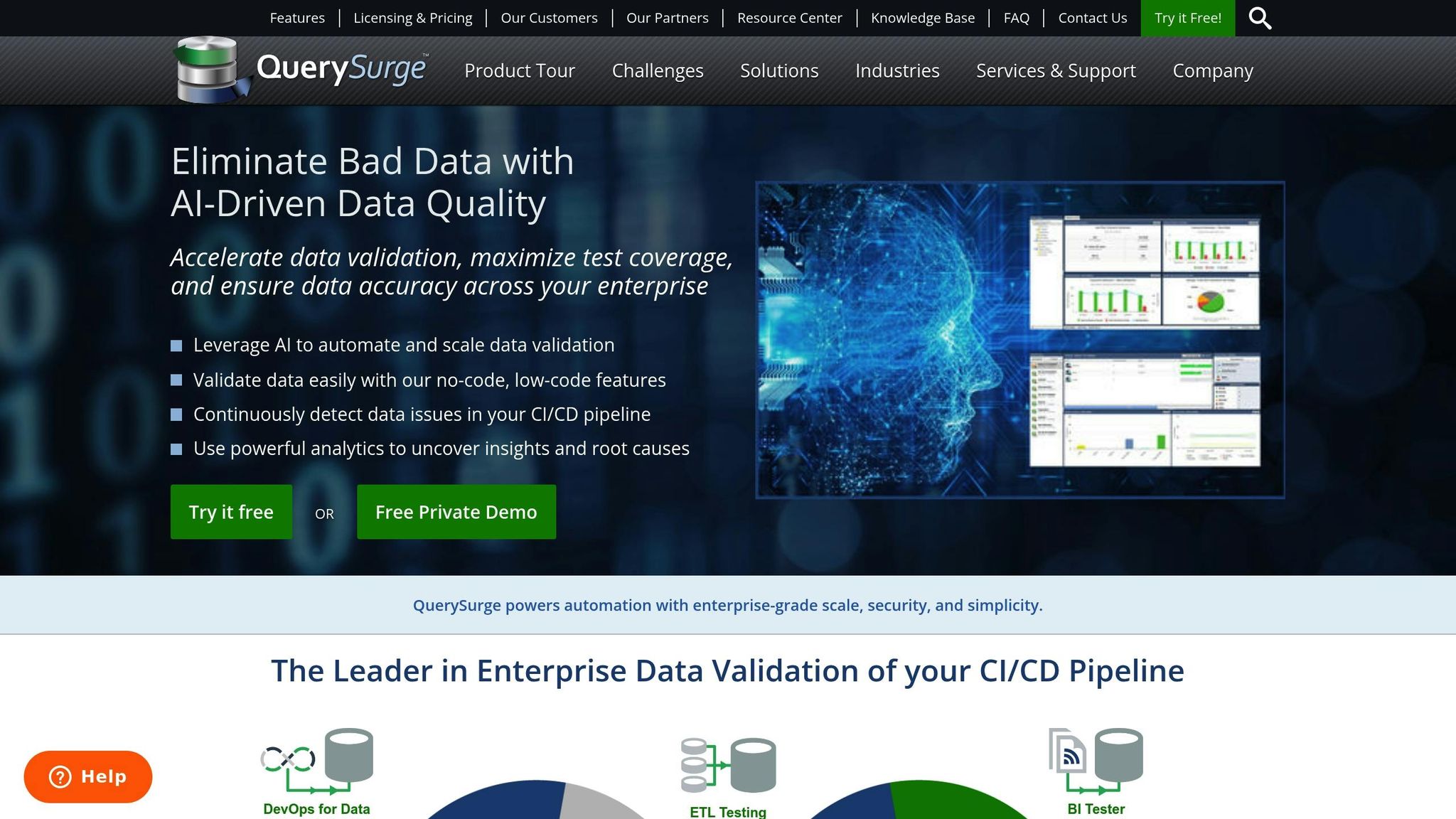
QuerySurge stands out as a trusted tool for automating ETL testing, especially in data warehouse and Big Data environments. Its low-code design and AI-powered data validation make the testing process more efficient. Plus, it integrates seamlessly with platforms like HP ALM, TFS, and IBM Rational Quality Manager, ensuring it fits smoothly into existing workflows. Users have reported cutting manual ETL testing time by as much as 80%. For example, a large healthcare provider in the U.S. reduced testing efforts by 60% while meeting HIPAA compliance standards. QuerySurge also offers flexible pricing, making it adaptable to various budgets.
Informatica Data Validation
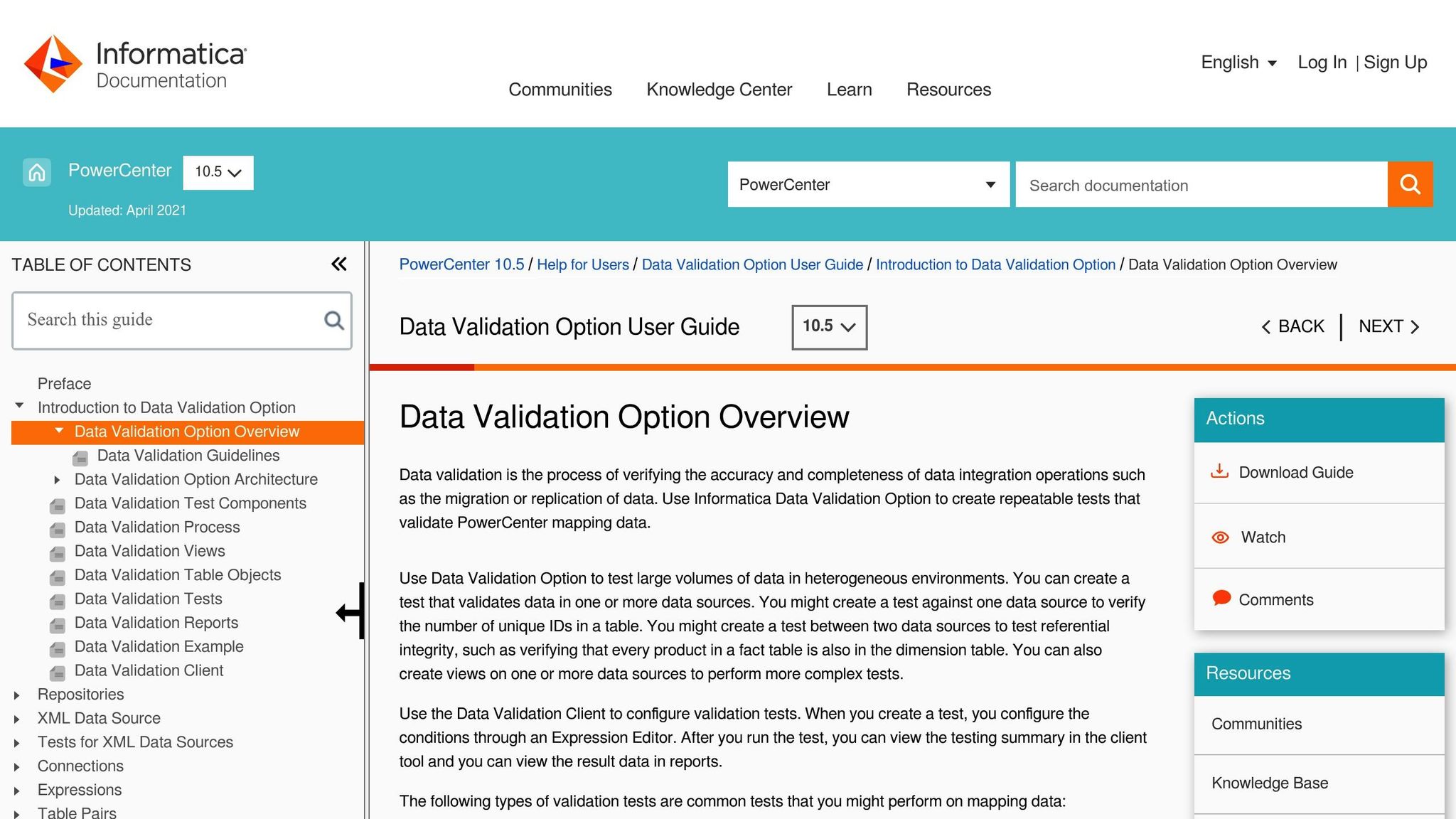
Informatica Data Validation is a go-to solution for large-scale enterprises. It excels in automating validation rule generation and supports end-to-end testing of complex data workflows. Its tight integration with Informatica PowerCenter and related products makes it particularly appealing for companies already using the Informatica ecosystem. However, the high licensing costs make it more suitable for larger organizations with significant resources.
Datagaps ETL Validator
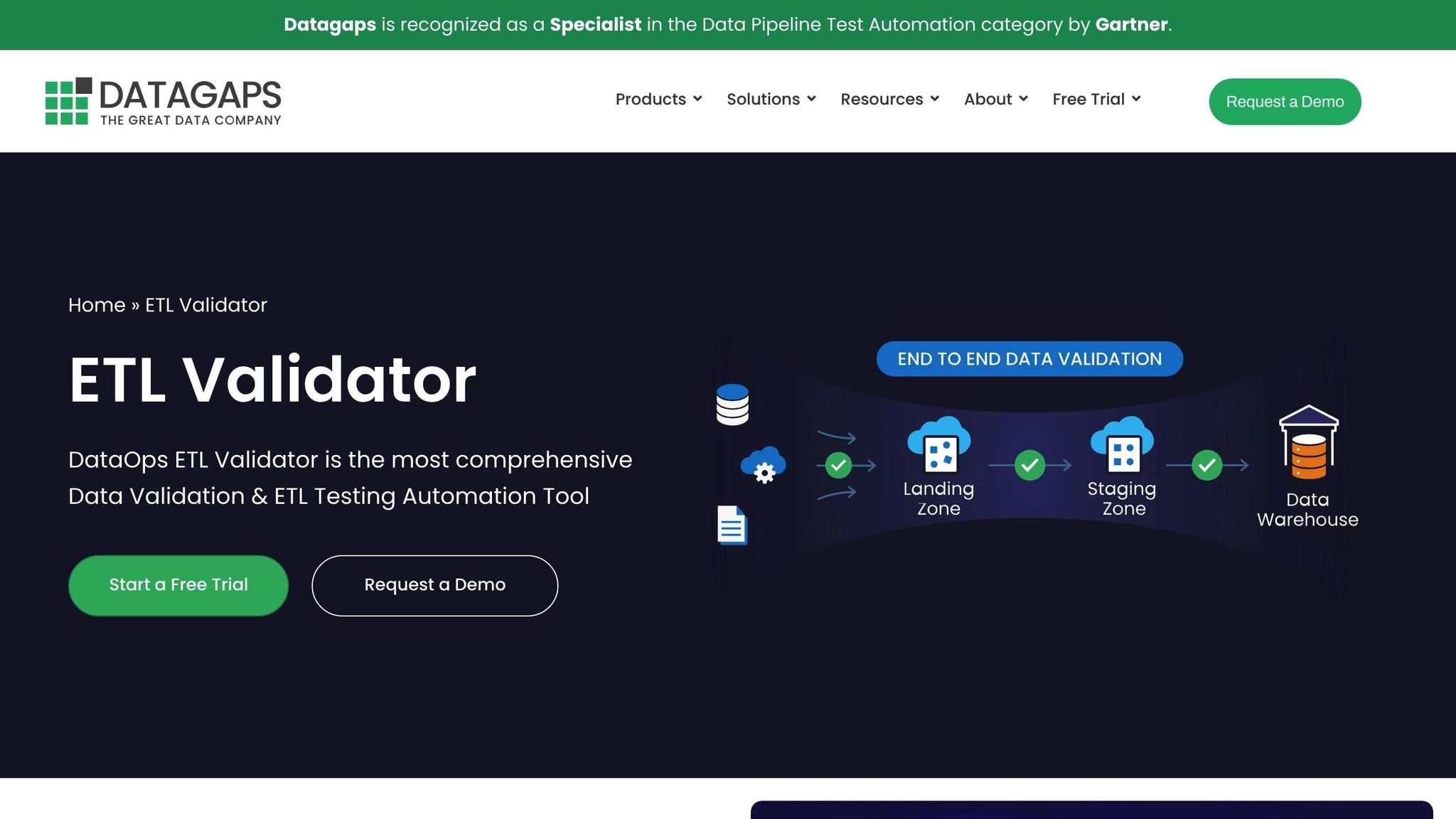
Datagaps ETL Validator combines powerful functionality with a user-friendly interface. Its drag-and-drop, codeless design makes it accessible even for teams without advanced technical skills. The tool automates data comparison, profiling, and validation across databases, files, and BI reports. Features like test scheduling and collaboration tools enhance its usability. While new users may face a learning curve, its detailed reporting and versatility make it a popular choice for small to mid-sized businesses. Pricing is tailored to the specific needs of each organization.
Talend Open Studio
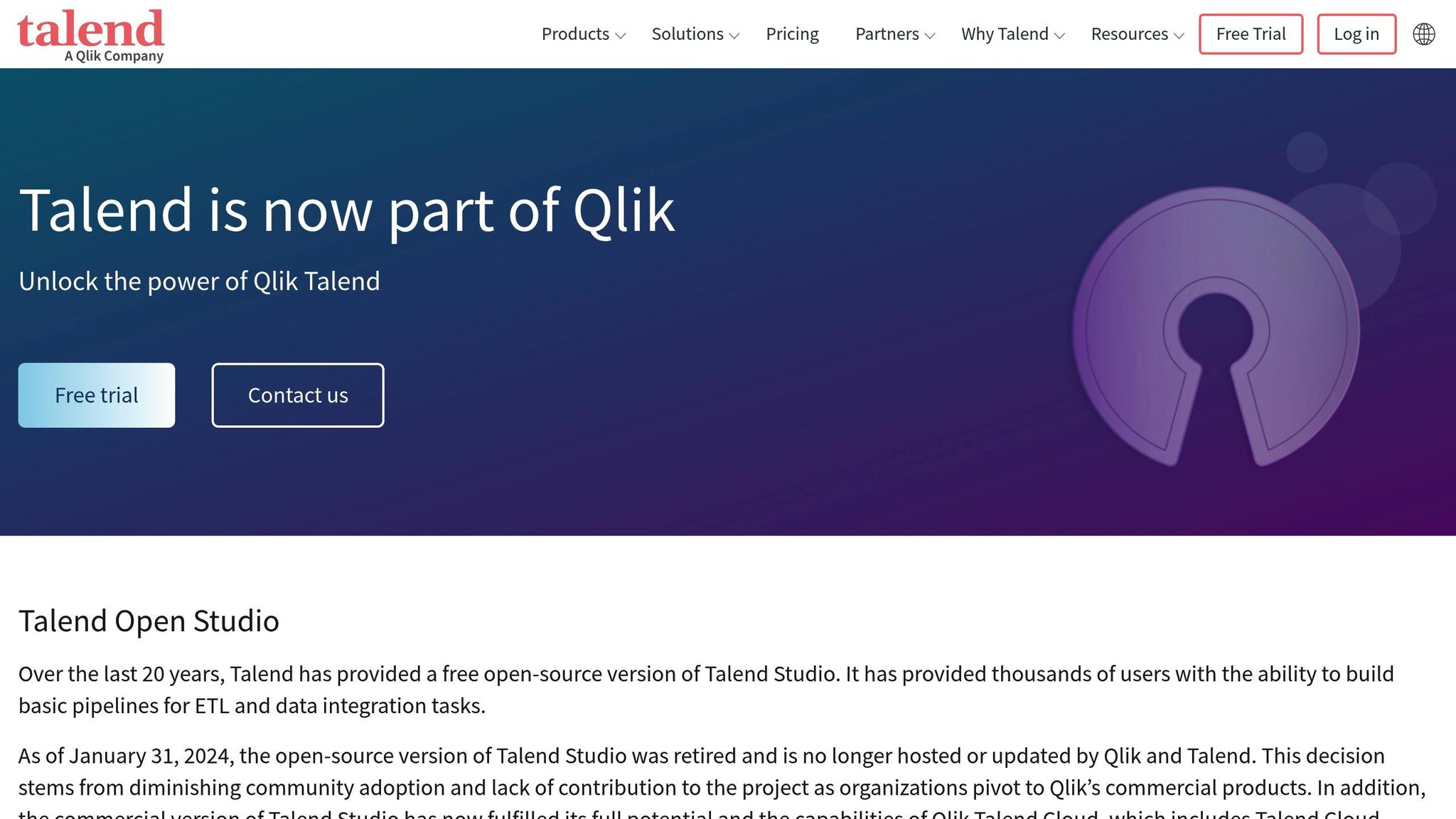
Talend Open Studio is a favorite among organizations seeking a cost-effective solution. This open-source tool offers extensive customization, a broad range of connectors, and the ability to integrate testing directly into ETL workflows. Supported by an active community, it enables real-time processing without licensing fees, making it a great option for startups and technically skilled teams. However, its full potential requires a solid technical background to manage and customize effectively.
iCEDQ
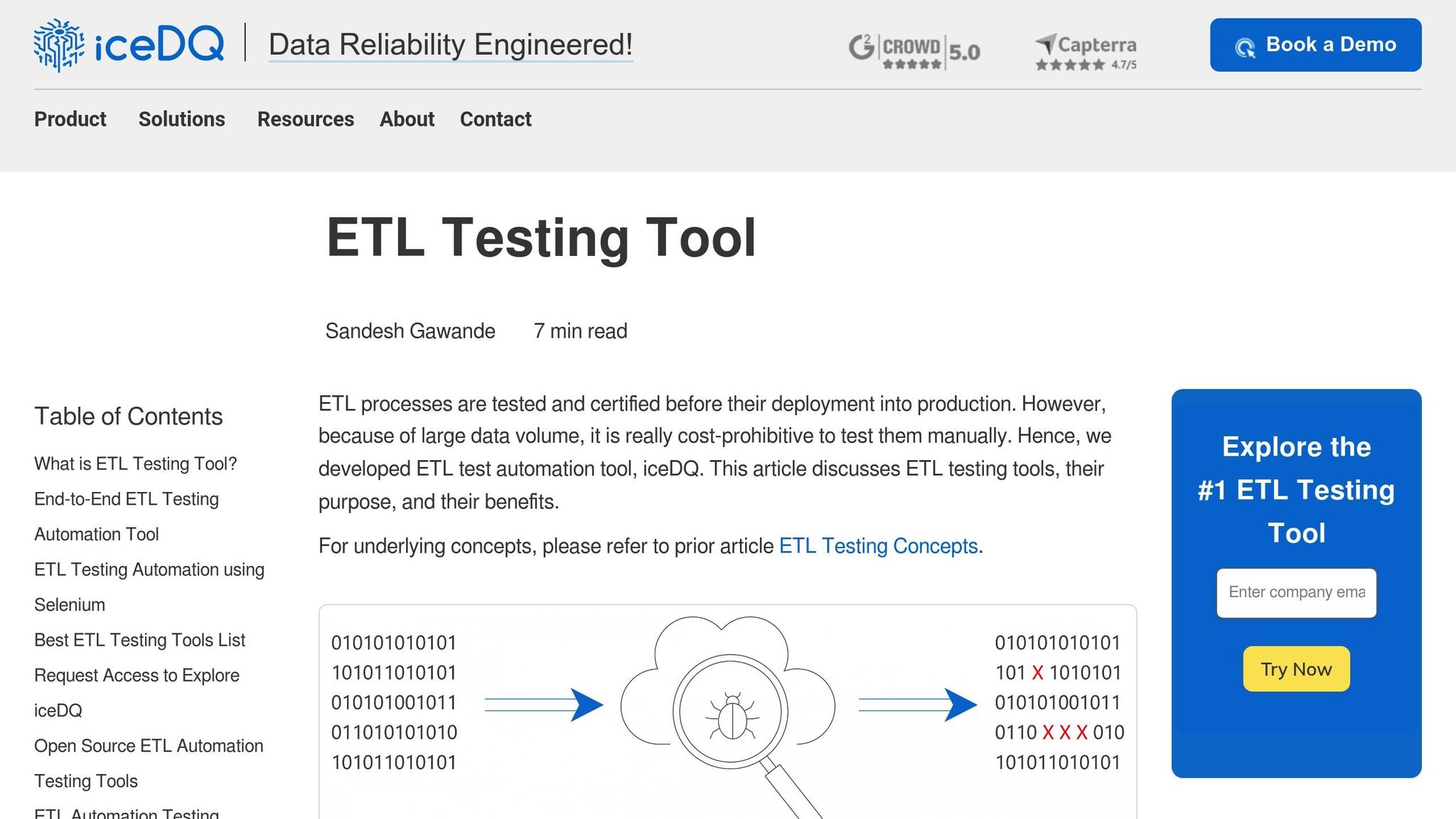
For industries where compliance and data integrity are critical, iCEDQ is a standout choice. This tool uses a rules-based approach to handle ETL testing, data migration, and production data monitoring. It features an in-memory testing engine, over 50 connectors, and a built-in scheduler. Its robust audit trails and detailed compliance reporting are particularly beneficial for finance and healthcare sectors. Additionally, iCEDQ's integration with CI/CD pipelines ensures continuous data quality monitoring.
RightData
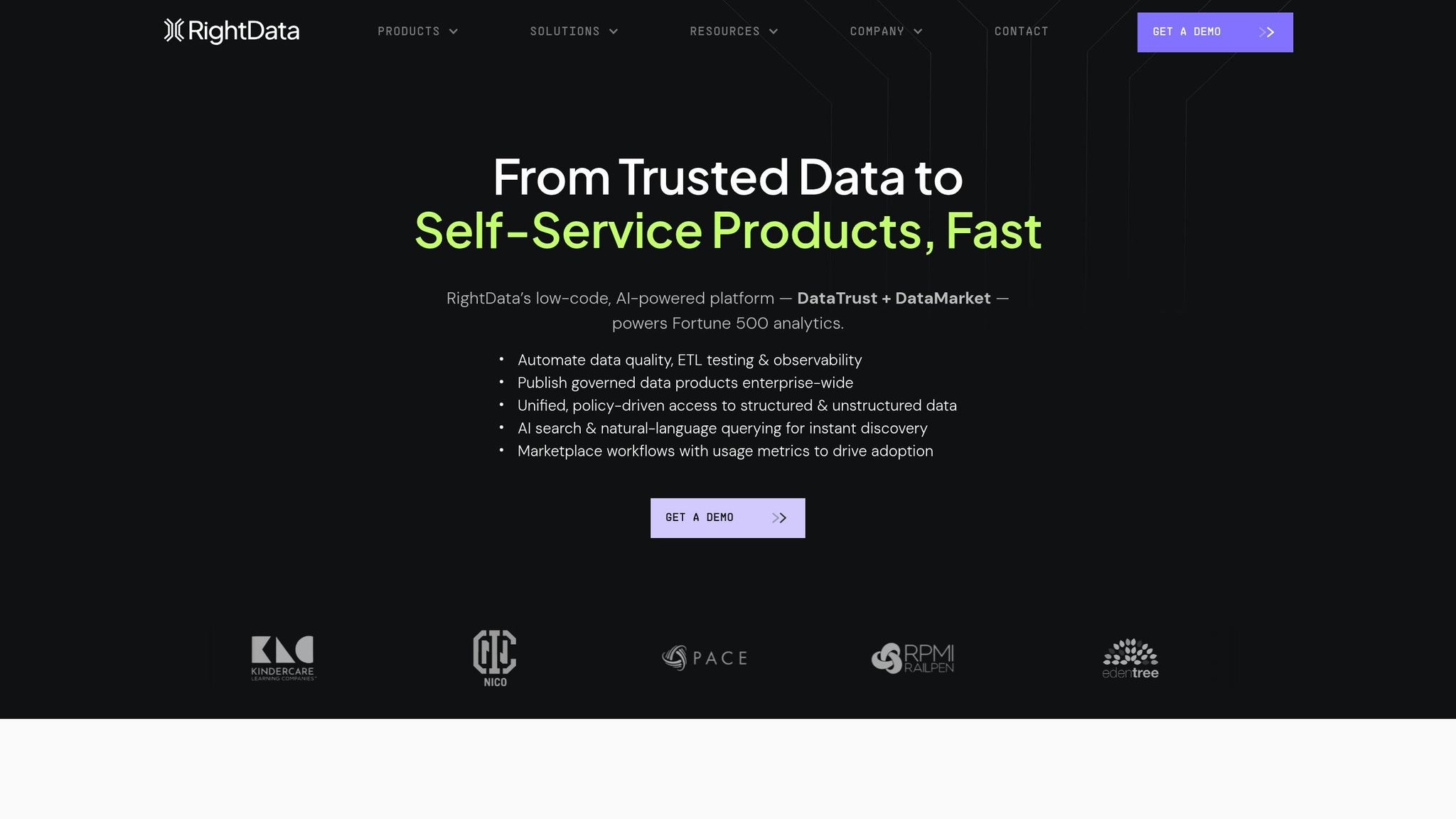
RightData emphasizes self-service ETL testing, offering a design that's easy to use even for non-technical users. With features like bulk validation, metadata exploration, data profiling, and snapshot reconciliation, the platform empowers business users to take charge of data testing. It also includes strong administrative controls and can handle large datasets efficiently, making it a scalable option for teams looking for rapid deployment.
BiG EVAL
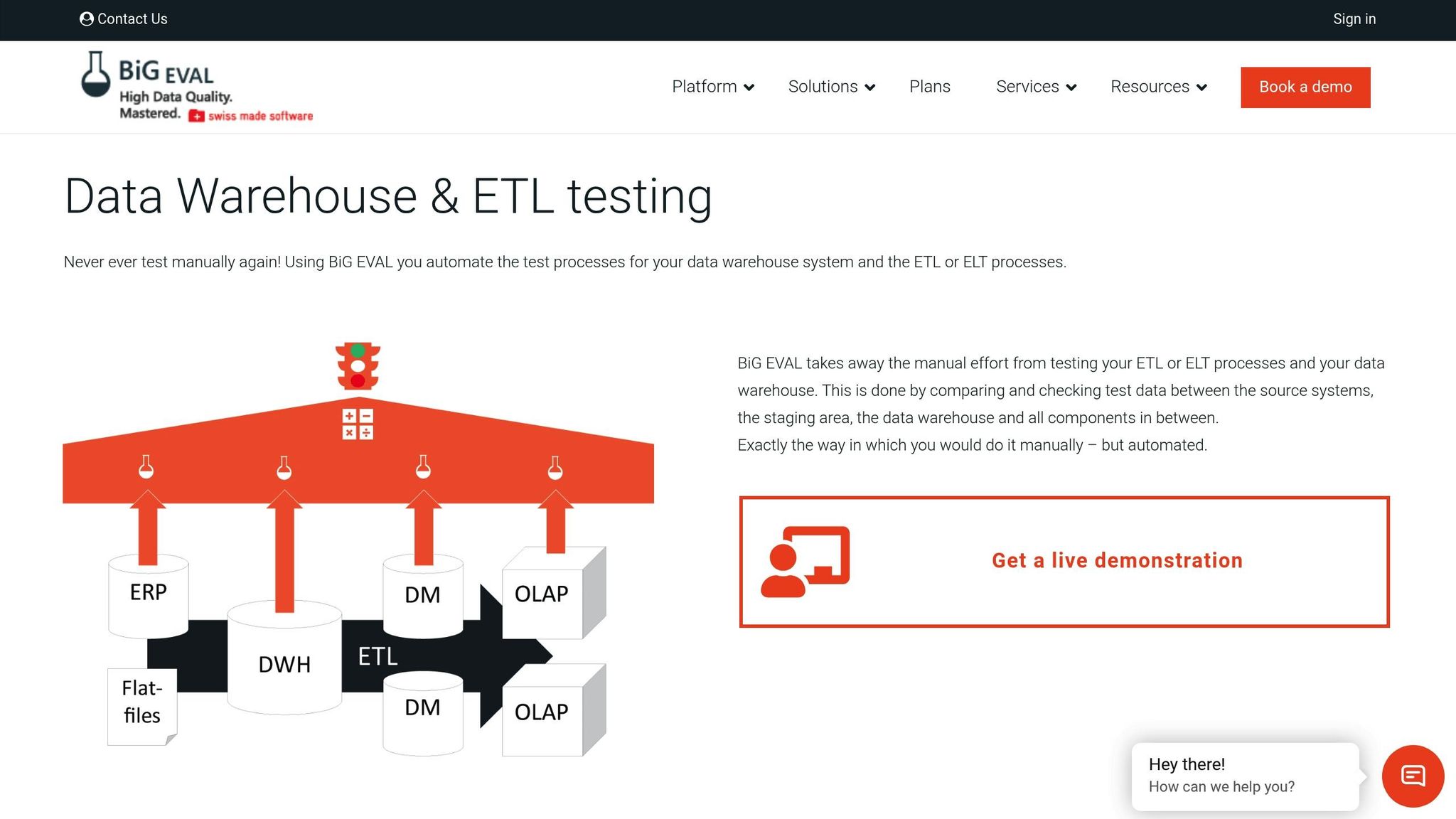
BiG EVAL focuses on delivering comprehensive test automation with a particular emphasis on U.S.-specific data platforms. It offers rule-based validation, workflow automation, and detailed reporting, making it a practical choice for businesses with localized needs. Known for its ease of use and cost-efficiency, BiG EVAL simplifies data validation processes while catering to industry-specific requirements.
This overview offers a snapshot of the leading ETL testing tools, setting the stage for further comparisons and integration strategies. Each tool has its unique advantages, so the right choice will depend on your team's specific needs and technical capabilities.
sbb-itb-d1a6c90
Tool Comparison
Choosing the right ETL testing tool requires weighing multiple factors, from technical features to budget constraints. Below is a detailed comparison tailored to the needs of U.S. organizations, focusing on compatibility, scalability, ease of use, integration, and cost.
Comparison Table
| Tool | Compatibility | Scalability | Ease of Use | Integration | Cost (USD) | Key Strengths | Main Limitations |
|---|---|---|---|---|---|---|---|
| QuerySurge | High | High | Medium | High | Premium | AI-powered validation, reported 80% reduction in manual testing time, strong BI integration | Higher cost; requires technical expertise for setup |
| Informatica Data Validation | High | High | Medium | High | Premium | Enterprise-grade features, seamless PowerCenter integration | Very high licensing costs; best for Informatica ecosystem users |
| Datagaps ETL Validator | High | High | Medium | High | Medium | Drag-and-drop interface, comprehensive data profiling, detailed reporting | Steeper learning curve for new users; customization needed for complex scenarios |
| Talend Open Studio | High | High | Medium | High | Free/Open Source | No licensing fees, extensive customization options, active community support | Requires a solid technical background; potential support costs |
| iCEDQ | High | High | Medium | High | Premium | Over 50 connectors, rules-based approach, strong compliance features | Steeper learning curve; higher initial investment |
| RightData | High | High | High | Medium | Medium | Self-service design, bulk validation, rapid deployment | Fewer integration options compared to premium tools |
| BiG EVAL | Medium | Medium | High | High | Medium | User-friendly interface, cost-effective, U.S.-focused features | May not scale well for extremely large datasets |
The table above provides a snapshot of the tools' strengths and limitations. Here's a closer look at the key factors:
Compatibility: Tools like QuerySurge, iCEDQ, and Datagaps ETL Validator shine with their broad connector support, making them versatile for various data sources, databases, and file formats. On the other hand, BiG EVAL's medium rating suggests it may not handle as many diverse connectors.
Scalability: As data volumes increase, scalability becomes essential. Most tools, especially premium ones, manage large datasets effectively. However, BiG EVAL might struggle with the vast data processing demands of larger enterprises.
Ease of Use and Integration: User-friendliness varies widely. RightData and BiG EVAL cater to teams with limited IT resources through their intuitive interfaces. QuerySurge, with its robust integration capabilities, is particularly strong in supporting business intelligence applications and CI/CD pipelines. Similarly, iCEDQ is noted for its seamless CI/CD pipeline integration, though it demands more technical expertise.
Cost: Budget is a critical consideration. Talend Open Studio offers a cost-effective solution as an open-source tool, though organizations should weigh potential expenses for support and customization. Premium tools like QuerySurge and iCEDQ come with higher price tags but deliver advanced features and enterprise-level support. For smaller organizations, these costs might be a barrier.
Key Takeaways: Each tool has its unique strengths. For instance, QuerySurge's ability to reduce manual testing time by 80% highlights its potential return on investment, though its premium pricing may limit accessibility for smaller teams. Meanwhile, Talend Open Studio provides flexibility and customization for technically adept teams, albeit with a steeper learning curve.
This comparison helps organizations match their specific needs with the right tool. If quick setup and ease of use are priorities, RightData or BiG EVAL may be ideal. For those seeking comprehensive enterprise features, QuerySurge or iCEDQ could be the better choice. By aligning tool capabilities with business requirements, companies can ensure a smooth integration into their data workflows.
How to Integrate These Tools
Integrating ETL testing automation tools effectively into your data infrastructure takes careful planning and execution. This process reshapes workflows, trains teams, and ensures technical capabilities align with business goals.
Steps for Successful Integration
Assessment and Planning Phase
Start by mapping out your current workflows and identifying key validation points where automation can have the most impact. Document your ETL processes, data sources, and target systems to gain a clear picture of your integration needs. This groundwork helps you prioritize tool features that align best with your existing architecture.
Phased Rollout Strategy
Instead of diving into a full-scale implementation, begin with a phased approach. Test the tool on non-critical data pipelines first. This lets your team explore its functionality without risking production systems. Starting small - such as with a single ETL pipeline - provides a manageable way to refine the process before scaling up across your entire data ecosystem.
Team Training and Stakeholder Involvement
Training is crucial for smooth adoption. Hands-on workshops should cover both the tool's specific features and general ETL testing concepts. Tailor training to different roles - data engineers, QA teams, and business users - so everyone understands their part in the automated testing process. Vendor-led sessions, like those offered for Informatica Data Validation, can provide valuable insights and best practices. A well-trained team not only ensures successful implementation but also supports ongoing improvements.
Technical Configuration
Set up the tool to integrate seamlessly with your ETL platforms, databases, and business intelligence systems. Use vendor documentation and support to simplify this step. Align automated tests with your data quality checkpoints and analytics objectives to ensure the tool delivers meaningful results.
Monitoring and Feedback Mechanisms
Establish systems to track the effectiveness of your automation efforts. Monitor metrics like reductions in data errors, time saved compared to manual testing, and improvements in data quality. Regular reviews will help identify areas for optimization, ensuring the tool continues to meet your needs as they evolve.
Getting the Most From Automation
Once the tool is integrated, take full advantage of its advanced features to enhance testing efficiency.
Leverage Advanced Automation Features
Many ETL testing tools come with features designed to save time and improve accuracy. For instance, automated scheduling lets tests run without manual input, and real-time monitoring provides instant alerts for data quality issues. Tools like iCEDQ include built-in schedulers to support repeatable, automated testing cycles.
CI/CD Pipeline Integration
Integrating your ETL testing tool with your continuous integration and deployment (CI/CD) pipelines streamlines workflows. Tools like QuerySurge allow automated tests to run during deployment, catching data quality issues before they impact production. This reduces manual effort and speeds up data delivery.
Bulk Validation and Rule-Based Testing
Use bulk validation and rule-based checks to ensure large datasets meet quality standards. This is particularly valuable when managing high volumes of data, where manual checks would be inefficient.
Real-Time Data Quality Monitoring
Set up continuous monitoring to get instant feedback on data quality. This proactive approach helps teams address issues immediately, rather than waiting for scheduled tests to uncover them.
Maximize ROI Through Strategic Feature Use
To get the most out of your investment, focus on features that align with your specific needs. For example, if business intelligence reporting is a priority, choose tools that integrate well with BI systems. If your organization handles complex data lineage, look for features like record-level logging and data tracking to maintain transparency throughout the ETL process.
Ongoing Optimization
Integration is not a one-and-done process. Regularly update test cases to reflect changes in data models and business requirements. Schedule audits and create a feedback loop among data engineers, QA teams, and business users to keep improving your testing strategy over time.
Conclusion
ETL testing automation has become a game-changer for U.S. businesses navigating increasingly complex data environments. The tools discussed in this article - from high-end options like QuerySurge and Informatica Data Validation to budget-friendly alternatives like Talend Open Studio - offer solutions to improve data quality and streamline validation processes.
Why Automation Matters
Automating ETL testing delivers tangible benefits. It can cut testing times by as much as 70% and reduce data errors by up to 90%. Beyond saving time and minimizing human error, automation speeds up insights, scales operations efficiently, and provides real-time issue detection. These capabilities are especially valuable for meeting compliance requirements and supporting strategic decisions in today’s fast-paced business landscape.
Choosing the Best Tool for Your Needs
The next step is finding the right tool for your organization. Consider factors like system compatibility, scalability, cost, ease of use, and the ability to integrate with CI/CD pipelines.
- Premium tools: Solutions like QuerySurge and iCEDQ are well-suited for enterprises with intricate ETL workflows, thanks to their advanced features and seamless integrations.
- Mid-range options: Tools such as RightData, BiG EVAL, and Datagaps ETL Validator strike a balance between functionality and cost, making them a great fit for mid-sized businesses.
- Open-source choices: Talend Open Studio offers a cost-effective alternative for smaller teams with the technical know-how to customize and manage the tool.
User-friendly, low-code or no-code interfaces can make these tools accessible to a broader range of users, not just technical experts. Additionally, strong integration with existing systems, such as business intelligence platforms and CI/CD pipelines, ensures you get the most out of your current technology investments.
As hybrid and multi-cloud data architectures become standard, the shift toward cloud-based and AI-enhanced ETL testing tools is gaining momentum. Starting with a pilot project can help you evaluate a tool’s effectiveness and return on investment before committing to a full-scale rollout. This approach ensures that the solution you choose aligns with your business needs and supports long-term growth in an increasingly complex data landscape.
FAQs
What should I look for in an ETL testing automation tool for my business?
When selecting an ETL testing automation tool, it's important to consider essential factors such as its functionality, user-friendliness, and how well it integrates with your current systems. The right tool should simplify your testing workflow, maintain data accuracy, and align with the unique requirements of your organization.
For companies aiming to streamline their operations, platforms like BizBot provide directories of tools that can make processes more efficient. These options are designed to be intuitive and accommodate businesses of various sizes, whether you're a freelancer or managing a growing enterprise.
How does integrating ETL testing tools with CI/CD pipelines improve data quality management?
Integrating ETL testing tools into CI/CD pipelines automates data quality checks, ensuring they’re consistently applied throughout development and deployment. This proactive approach catches data issues early, helping to minimize errors and maintain dependable data for decision-making.
Embedding ETL testing within CI/CD workflows simplifies testing processes, boosts team collaboration, and ensures data transformations meet quality standards before they hit production. The result? Saved time and greater confidence in the accuracy and reliability of your data.
What are the benefits and challenges of using open-source ETL testing tools like Talend Open Studio?
Open-source ETL testing tools, like Talend Open Studio, come with a range of perks. For starters, they’re budget-friendly and provide the freedom to tailor them to your business's specific needs. Plus, these tools often have active user communities that share resources, offer support, and roll out regular updates - making them a solid option for teams willing to dive in.
That said, open-source tools aren’t without their challenges. Setting them up and maintaining them can demand a higher level of technical know-how. And unlike commercial options, they typically don’t come with dedicated customer support, which could be a drawback if your team requires quick troubleshooting. To decide if an open-source solution is the right fit, take a close look at your team’s technical skills and the demands of your project.


